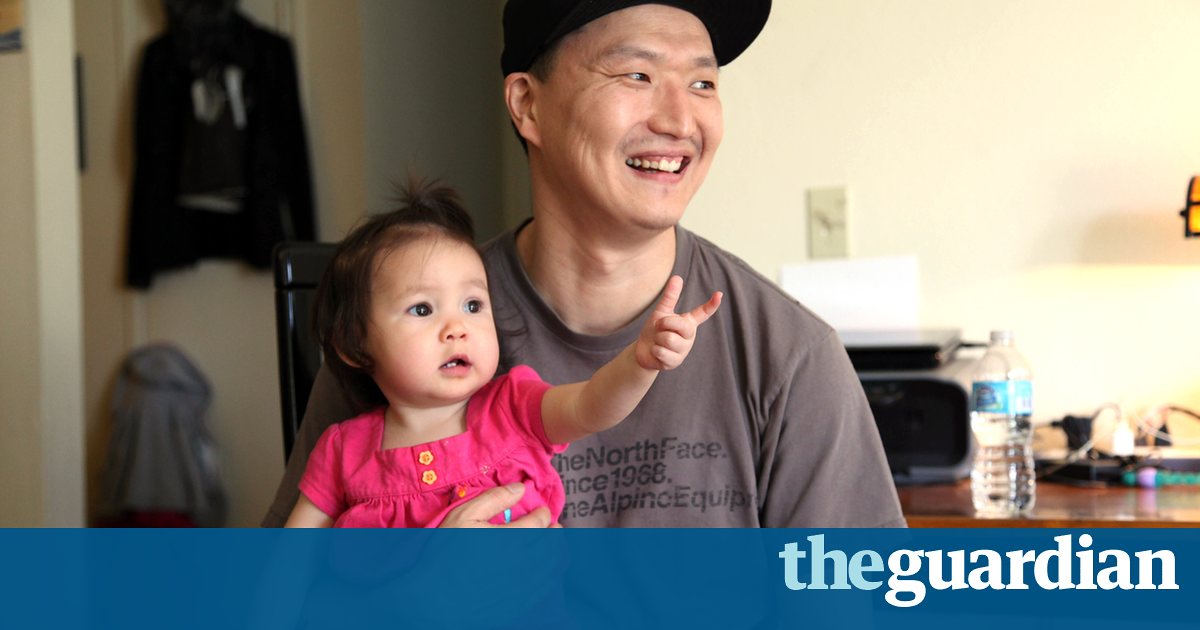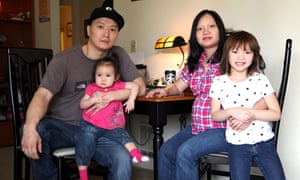After 37 years in US, Korean adoptee speaks out about imminent deportation

Despite being adopted at almost four years old by American parents, a court ruled that Adam Crapser is not a US citizen

Thirty-seven years after being adopted to the US, Adam Crapser is being deported to South Korea, his birth country a place he knows very little about, where he doesnt speak the language, and to a culture he has had little to no exposure to.
When he lands in Seoul, Crapser, 41, will be able to write his name in Korean and recite the Korean alphabet. With only that, he will need to fill out documents to become an official Korean citizen, open a Korean bank account, get a job to support himself, and money to secure the expensive deposit for an apartment rental.
But first, I will try to find a place to stay and rent a room, he said on Tuesday, in a phone interview from the Northwest Detention Center in Tacoma, Washington, where hes been held for nearly nine months.
On Monday, Crapsers two-year-long immigration case came to an end when, in a courtroom located in the detention center, Judge John C ODell denied Crapsers plea to cancel his deportation removal and Crapser waived his right to appeal. He could be deported as early as three weeks from now. But in the meantime, the Korean consulate in Seattle must issue him travel documents, and Immigration and Customs Enforcement has to arrange his flight out of the US.
His ordeal began in January 2015 with a knock on his door. Two Department of Homeland Security officers told him he was facing deportation charges because, despite being adopted at almost four years old by American parents, he was not a US citizen.
Before 2001, foreign-born adoptees such as Crapser werent granted automatic citizenship, instead entering the US on foreign-born adoption visas. Last November, Senator Amy Klobuchar, a Minnesota Democrat, introduced the Adoptee Citizenship Act, which would grant retroactive citizenship to all foreign-born adoptees. Then in June, a companion bill was introduced in the House, but there has been no movement in Congress since.
His first adoptive parents, a strict couple, relinquished custody to the state of Oregons foster care system in 1985, when he was around 10 years old, after deciding they didnt want him any more. After bouncing around foster homes, he was adopted into the Crapser family. Those parents were eventually arrested in 1991, charged with 34 counts of rape, sexual abuse and criminal mistreatment, including extreme physical assault. They were eventually found guilty of 12 of those charges. Adam Crapser was 17 at the time.
Most people dont understand that I didnt ask to come here [US], he said about his adoption. I got placed with some idiots but I went on to live my life the best I could.
He sighed: It obviously wasnt good enough.
A troubled childhood then became a troubled adulthood, but things had settled down by the time the immigration authorities knocked on his door in 2015. He was living in Vancouver, Washington, with his wife and two young daughters, a third on the way.
Crapser had filed for a green card in 2012, trying to finally do what his adoptive parents had never gotten around to doing. But a standard background check in the application flagged his criminal record.

According to the Korean government, there are only 10 other adopted Koreans, known as deportees, who grew up in the US as children but were then deported as adults.
Other Korean deportees like Crapser have said that they were left at the Incheon airport alone, with no plan and no money. Because Crapsers case has been highly publicized, he has garnered an immense amount of support from many, including the Korean adoptee community. A lot of deportees unfortunately didnt have the support that I have, he says. I was fortunate and have braced myself for this.
John Compton, internal adviser of Global Overseas Adoptee Link, an adoptee-led nongovernmental organization in Seoul, says he will try to meet Crapser upon his arrival in Korea. Hes also scrambling to find a place for Crapser to sleep on his first night in Seoul.
Some financial aid has been given to other deportees by a Korean government group, Korea Adoption Services, but Compton says it has run out of funds.
In a country that places a high value on higher education and language skills, finding a job will be difficult. Other Korean deportees work low-wage jobs with no tips in restaurants or bars.
Crapser does not have a college degree and has minimal language skills he only recently learned the alphabet and his name because another Korean at the detention center taught him. I have to see if there are English-speaking [jobs] or its going to be really difficult, he said. Nonetheless, he cant work until he has Korean government identification and a bank account.
Even with that ahead of him, Crapser sounds eager to go this nightmarish experience has opened his eyes.
It made me see the brutality of the immigration system, he says. You are property of the federal government and now I am a Korean citizen, waiting to be picked up.
The stress of Crapsers deportation proceedings has taken a physical and emotional toll on him even affecting his personal relationships. In July 2015, a reported domestic dispute with his wife, Anh, ultimately led to his arrest and placed him in NWDC.
Now he has spent the greater part of 2016 locked inside a complex that resembles a drab suburban business park. He describes life inside as a place that breaks you.
[The detention centers] pressure people so people will sign their rights off and self-deport, he says.
He spends the majority of his time in a 70-person dorm. He says he is only allowed to go outside one hour a day, but in order to be alone, he chooses to stay inside. He says he hasnt seen sunlight for 75 days.
There is a sense of relief in his voice: I cant wait to get out of here. This place is hell.
Although he is being kicked out of the US a place he didnt have a choice to come to in the first place he is striving to find the good in his bad situation.
In December, Korean television company MBC found his birth mother.
My plan is to just to get over there to spend time with my biological family and immerse myself with [them], he said with excitement. I think she [his birth mother] is happy to see me. And he has since reconciled with his wife and says she plans to follow him to Korea with their three daughters.
I have lived some very hard times in America, he said softly, but I am still alive and still breathing.
Read more: https://www.theguardian.com/us-news/2016/oct/28/us-immigration-adam-crapser-south-korea-deportation